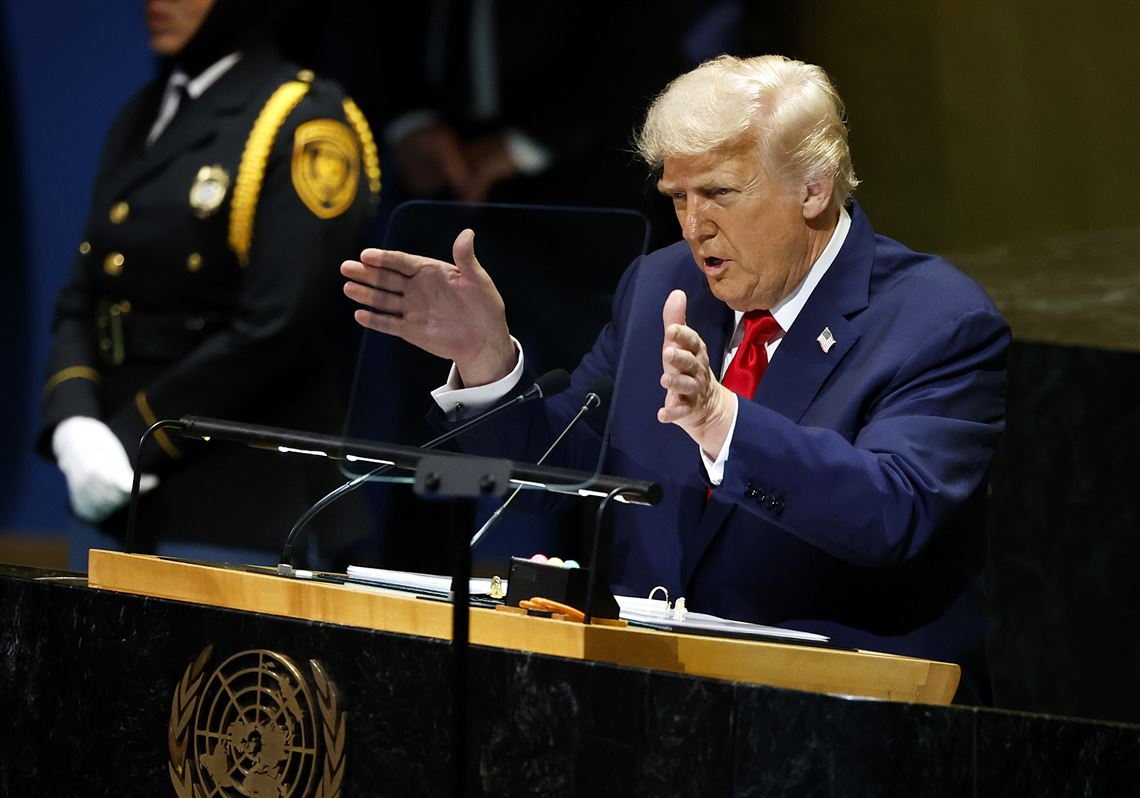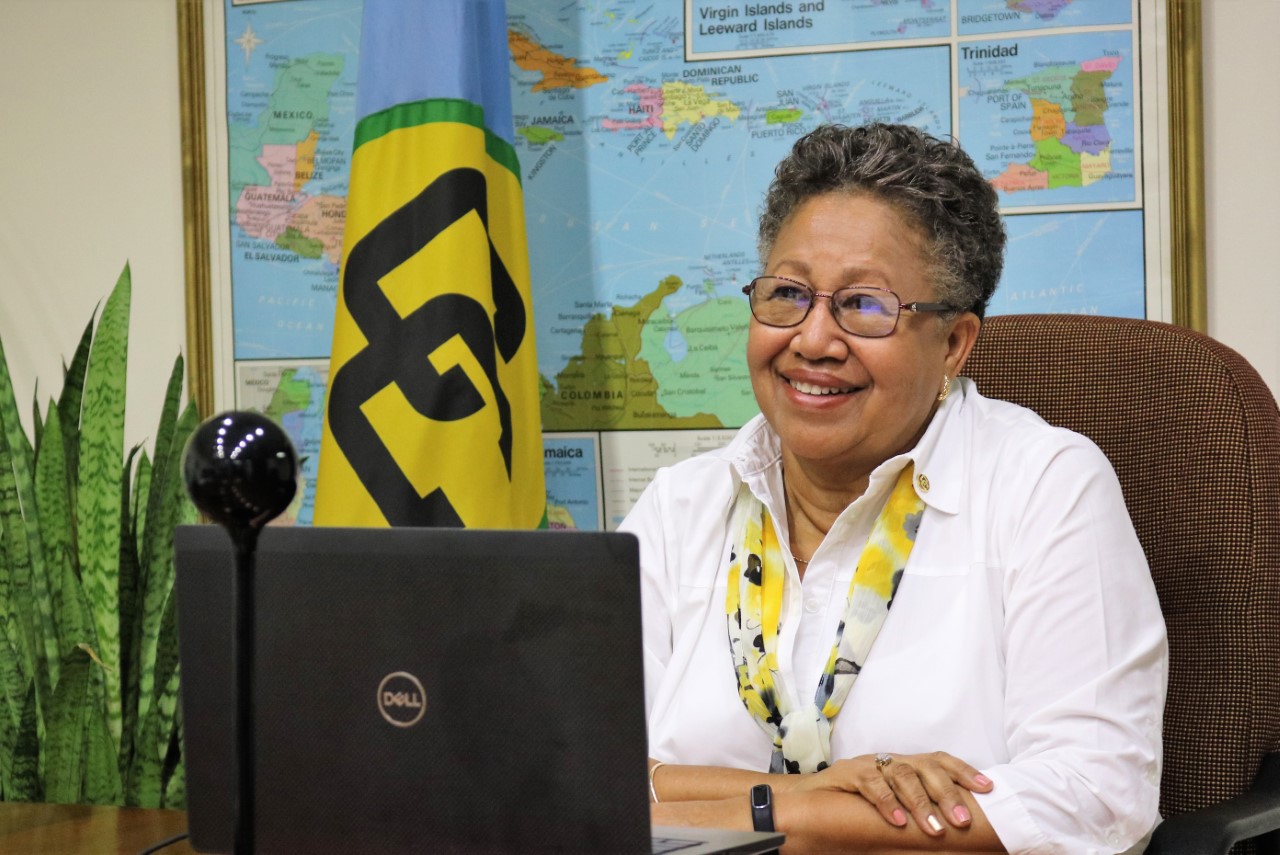News
Trump at UN: ‘No President Has Done What I’ve Done’

Trump at UN: ‘No President Has Done What I’ve Done’
United States President, Donald Trump, on Tuesday told world leaders at the United Nations General Assembly (UNGA) in New York that the US had entered its “golden age” under his leadership, boasting of historic trade deals and claiming credit for ending seven international conflicts.
In a speech laden with self-praise, Trump said America had become “the best place on earth to do business,” citing sweeping global tariffs he introduced in his second term and trade pacts signed with the United Kingdom, European Union, Japan, South Korea, Vietnam and others.
“America is respected again, like it has never been respected before,” Trump declared, adding that recent record highs in US stock markets, tax and regulation cuts, and border security reforms were proof that his administration had delivered.
The US president also made a bold claim that his government had ended wars previously considered “unendable.”
He listed conflicts between Cambodia and Thailand; Kosovo and Serbia; Pakistan and India; Israel and Iran; Egypt and Ethiopia; Armenia and Azerbaijan; and the Democratic Republic of Congo and Rwanda.
“No other president has ever done anything close to that,” Trump said, while berating the UN for failing to play a role in resolving the disputes.
Earlier, UN Secretary-General, Antonio Guterres, had opened the annual debate by stressing that the world needs the UN’s “unique legitimacy, convening power and vision to unite nations.”
But Trump dismissed such assertions, insisting that his leadership had pushed NATO allies to increase defence spending from 2 per cent to 5 per cent of GDP and strengthened partnerships in the Gulf with Saudi Arabia, Qatar and the UAE.
The president, who began his address by attacking his predecessor’s administration as a “set of disasters,” said the US was now the “hottest country in the world.”
“This is indeed the golden age of America,” he told the assembly.
News
CARICOM Seeks More Investment, Partnerships to Tackle NCDs, Mental Health

CARICOM Seeks More Investment, Partnerships to Tackle NCDs, Mental Health
Secretary-General of the Caribbean Community (CARICOM), Dr. Carla Barnett, has said that ending the epidemic of Non-Communicable Diseases (NCDs) and addressing mental health challenges will require fresh investment, innovative financing, stronger partnerships and bold policy action.
Dr. Barnett made this known on Thursday while addressing a High-Level Breakfast on NCDs and Mental Health, held on the sidelines of the 80th United Nations General Assembly (UNGA) in New York.
She recalled that since the landmark 2007 Port-of-Spain Declaration, CARICOM has championed a multi-sectoral response to NCDs, introducing initiatives such as Caribbean Wellness Day and the elimination of trans fats.
However, she lamented that despite some progress, most Member States are off track to meet the 2025 global target of reducing premature NCD mortality by 25 per cent, with only Antigua and Barbuda, Barbados, and Grenada showing encouraging results.
The Secretary-General underscored the need for greater financial commitment and collaboration at both regional and global levels.
According to her, the reality of limited fiscal resources in Small Island Developing States (SIDS) has slowed progress, making it necessary to explore innovative financing mechanisms, strengthen public-private partnerships and enhance monitoring frameworks.
Dr. Barnett noted that the worsening impacts of climate change are also aggravating health challenges in the Region, while rising cases of mental health conditions present an additional burden.
Vulnerable populations, including persons with disabilities and the elderly, she said, remain at particular risk.
“While daunting, ending the epidemic of NCDs in CARICOM is not an insurmountable task. The lessons learnt over the past 18 years can strategically position the Caribbean Community in the next decade,” she said, stressing the need for renewed commitment from governments, development partners and civil society.
She further called for stronger social safety nets, legislative action, and investment in assistive living technologies for the ageing population.
Dr. Barnett commended the Caribbean Public Health Agency (CARPHA), the Pan-American Health Organization/World Health Organization (PAHO/WHO), and the Healthy Caribbean Coalition (HCC) for their role in advancing health initiatives, while also acknowledging the political will demonstrated by CARICOM Heads of Government.
Reaffirming CARICOM’s resolve, Dr. Barnett maintained that sustainable progress against NCDs and mental health challenges would only be achieved through collective commitment, increased funding and equitable policy responses that put people at the centre.
News
Kenyan Police Declare ₦11m Bounty on Fugitive Serial Killer

Kenyan Police Declare ₦11m Bounty on Fugitive Serial Killer
Kenyan police have announced a reward of 1 million shillings (about ₦11 million) for information leading to the arrest of Collins Jumaisi Khalusha, a suspected serial killer accused of murdering more than 40 women in Nairobi.
Khalusha, who was arrested in August 2024, escaped from custody shortly after his detention, alongside 12 other inmates, in what has become one of the country’s most embarrassing security lapses.
He reportedly cut through a wire mesh roof and scaled a perimeter wall at a police station considered one of Nairobi’s most secure — located near the US Embassy and UN offices.
The suspect had been linked to the gruesome killings of young women, aged between 18 and 30, whose mutilated bodies were discovered in a disused quarry in the capital.
Outrage has continued to trail the police’s inability to re-arrest him more than a year after the jailbreak.
Human rights activist, Khalid Hussein, accused authorities of failing to take the matter seriously, alleging that some bodies were still rotting in the quarry.
He described the latest reward announcement as a reaction to public embarrassment caused by a local TV documentary on the unsolved murders.
“This one million shillings reward is absolutely useless. It is a reaction, not a commitment,” Hussein said.
The Directorate of Criminal Investigations (DCI), in a post on X, promised to pay the bounty to anyone who provides “credible information” that leads to Khalusha’s re-arrest.
Police had previously announced a reward last year, but without specifying an amount.
Several officers were also arrested on suspicion of aiding the escape but were later released on bail.
The case has put Kenyan law enforcement under intense scrutiny, with many citizens questioning how a mass killer could have been allowed to slip through the cracks, especially as the crime scene was barely 100 metres from a police station.
At the time of Khalusha’s arrest, DCI chief Mohamed Amin described him as “a psychopathic serial killer who has no respect for human life.”
He was scheduled to face multiple murder charges before his disappearance.
Interior Minister Kipchumba Murkomen, reacting to the escape, described the incident as “regrettable” and “a sad story,” while expressing hope that the fugitive would soon be captured.
News
CARICOM Pushes Climate, Development Agenda at UNGA 80

CARICOM Pushes Climate, Development Agenda at UNGA 80
The Caribbean Community (CARICOM) has confirmed its participation in the 80th Session of the United Nations General Assembly (UNGA), billed to hold in New York from September 20 to 29, 2025.
The regional bloc will be represented by Secretary-General, Dr. Carla Barnett, and the Assistant Secretary-General for Foreign and Community Relations, Ms. Elizabeth Solomon, alongside Heads of Government and Foreign Ministers.
According to a statement from the CARICOM Secretariat, the delegation will use the high-level meetings, bilateral engagements, side events and the General Debate to advance the region’s positions on climate action, sustainable development, peacebuilding and global health.
Heads of Government from the region are expected to participate in the General Debate from September 23 to 27, with Suriname delivering the opening statement on behalf of the Community.
On September 22, CARICOM will join the UNGA’s High-Level Meeting commemorating the 80th Anniversary of the United Nations, as well as a High-Level Event on the Multilateral Support System hosted by Kenyan President, William Ruto.
Dr. Barnett is also billed to play a central role in several other engagements, including the signing of an MoU between UNCTAD and CARICOM, a High-Level Meeting on Haiti, and the First Biennial Summit for a Sustainable, Inclusive and Resilient Global Economy.
Other engagements will centre on climate mobility, non-communicable diseases and mental health.
CARICOM’s leadership on the Haitian crisis will again be spotlighted in a Roundtable Discussion titled “Making the Case for Haiti” on September 22, where ASG Solomon is expected to lead the Community’s interventions.
Beyond UNGA events, Solomon will represent CARICOM at the Atlantic Council Global Citizen Awards, while Foreign Ministers will participate in the Commonwealth Foreign Affairs Ministers Meeting, hold talks with Nordic counterparts, and join the EU-CELAC Foreign Ministers Meeting.
They will also convene the 24th Special Meeting of the Council for Foreign and Community Relations (COFCOR) on September 22 to deliberate on key foreign policy issues and upcoming international engagements.
Speaking ahead of the session, Solomon described COFCOR as “a very important opportunity” for the bloc to align its positions before the high-level week begins.
The UNGA 80, themed “Better Together: 80 Years and More for Peace, Development and Human Rights,” comes at a time the global community is seeking to reinforce solidarity and renew its commitment to multilateralism.
-

 Politics4 days ago
Politics4 days agoMalema Convicted for Gun Offence, Faces 15-Year Jail Term
-

 Analysis4 days ago
Analysis4 days agoDangote vs PENGASSAN: When Labour Rights Collide with National Dreams
-

 Politics4 days ago
Politics4 days agoAgain, US Govt Shuts Down!
-

 Politics4 days ago
Politics4 days agoDR Congo Court Sentences Ex-President Kabila to Death
-

 News4 days ago
News4 days agoKenyan Police Declare ₦11m Bounty on Fugitive Serial Killer
-
Milestone4 days ago
Excel Group CEO Celebrates Chief Dr. Sir Kelechi Eke on Birthday










